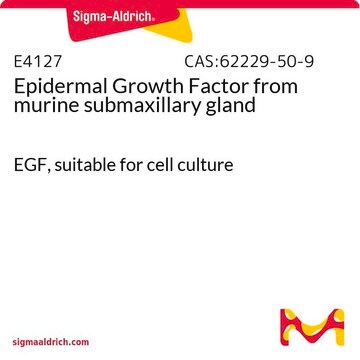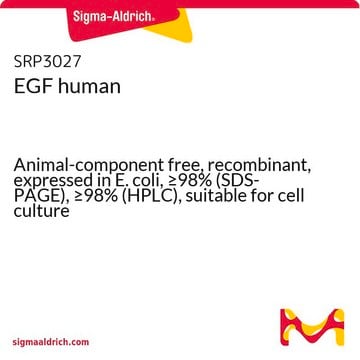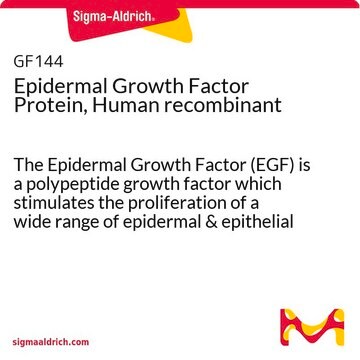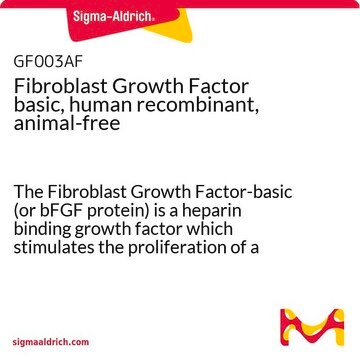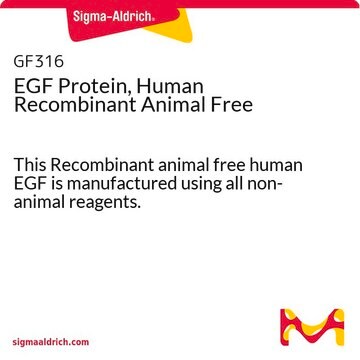E9644
Epidermal Growth Factor, human
≥97% (SDS-PAGE), recombinant, expressed in E. coli, lyophilized powder, suitable for cell culture
Synonym(s):
Epidermal Growth Factor human, EGF
About This Item
Recommended Products
Product Name
hEGF, EGF, recombinant, expressed in E. coli, lyophilized powder, suitable for cell culture
biological source
human
Quality Level
recombinant
expressed in E. coli
assay
≥97% (SDS-PAGE)
form
lyophilized powder
potency
0.08-0.8 ng/mL ED50/EC50
mol wt
~6 kDa
packaging
pkg of 5X0.2 mg
pkg of 0.2 mg
pkg of 0.5 mg
storage condition
avoid repeated freeze/thaw cycles
technique(s)
cell culture | mammalian: suitable
impurities
≤1 EU/μg endotoxin (EGF)
color
white
solubility
water: soluble, clear, colorless
UniProt accession no.
storage temp.
−20°C
SMILES string
S(CC[C@H](NC(=O)[C@@H](NC(=O)[C@@H](NC(=O)CNC(=O)[C@@H](NC(=O)[C@@H](NC(=O)[C@@H](NC(=O)[C@@H](NC(=O)[C@@H](NC(=O)CNC(=O)[C@@H](NC(=O)[C@@H](NC(=O)[C@@H](NC(=O)[C@@H](NC(=O)[C@H]%12N(CCC%12)C(=O)[C@@H](NC(=O)[C@@H](NC(=O)[C@@H](NC(=O)[C@@H](NC(=O)[C@@H](N
InChI
1S/C270H401N73O83S7/c1-24-134(19)217(262(420)293-112-201(355)298-161(69-74-205(359)360)229(387)301-160(45-35-82-286-269(279)280)228(386)333-192(119-428)255(413)307-162(68-73-198(274)352)230(388)316-176(94-141-54-64-150(350)65-55-141)241(399)304-159(44-34-
InChI key
GVUGOAYIVIDWIO-UFWWTJHBSA-N
Gene Information
human ... EGF(1950)
Looking for similar products? Visit Product Comparison Guide
Application
Biochem/physiol Actions
Cellular functions affected by EGF: mitosis, ion flux, glucose transport, glycolysis, nucleic acid and protein synthesis, survival, growth, proliferation and differentiation.
Biological affects of EGF: inhibition of gastric acid secretion, fetal growth and development and neuromodulation in the central nervous system.
Pathways affected by EGF: EGFR signaling, MAPK cascade, PIP, Ca+2 signaling
Components
Caution
Preparation Note
Analysis Note
Storage Class
11 - Combustible Solids
wgk_germany
WGK 3
flash_point_f
Not applicable
flash_point_c
Not applicable
ppe
Eyeshields, Gloves, type N95 (US)
Choose from one of the most recent versions:
Certificates of Analysis (COA)
Don't see the Right Version?
If you require a particular version, you can look up a specific certificate by the Lot or Batch number.
Already Own This Product?
Find documentation for the products that you have recently purchased in the Document Library.
Customers Also Viewed
Articles
Human pancreatic cancer organoid biobank (PDAC organoids) with various KRAS mutations to aide in 3D cell culture and cancer research applications.
Role of growth factors in stem cell differentiation and various growth factors for your research at sigmaaldrich.com
Organoid culture products to generate tissue and stem cell derived 3D brain, intestinal, gut, lung and cancer tumor organoid models.
Protocols
A stem cell culture protocol to generate 3D NSC models of Alzheimer’s disease using ReNcell human neural stem cell lines.
Step-by-step culture protocols for neural stem cell culture including NSC isolation, expansion, differentiation and characterization.
Related Content
Monitor barrier formation using colon PDOs, iPSC-derived colon organoids, Millicell® cell culture inserts, and the Millicell® ERS. 3.0.
Our team of scientists has experience in all areas of research including Life Science, Material Science, Chemical Synthesis, Chromatography, Analytical and many others.
Contact Technical Service
